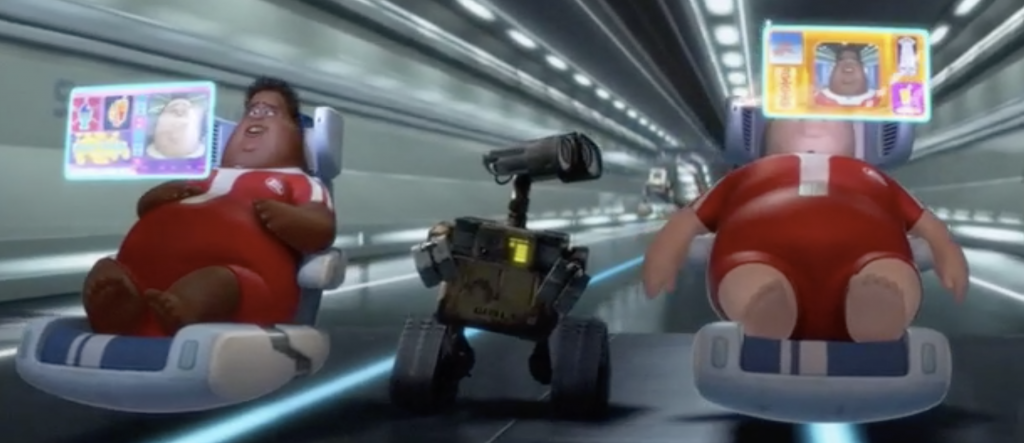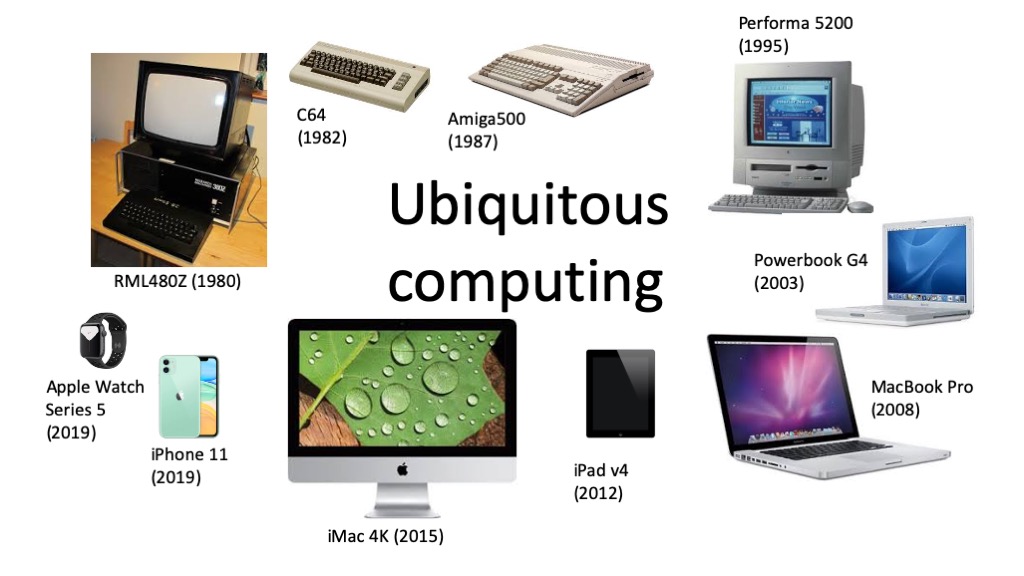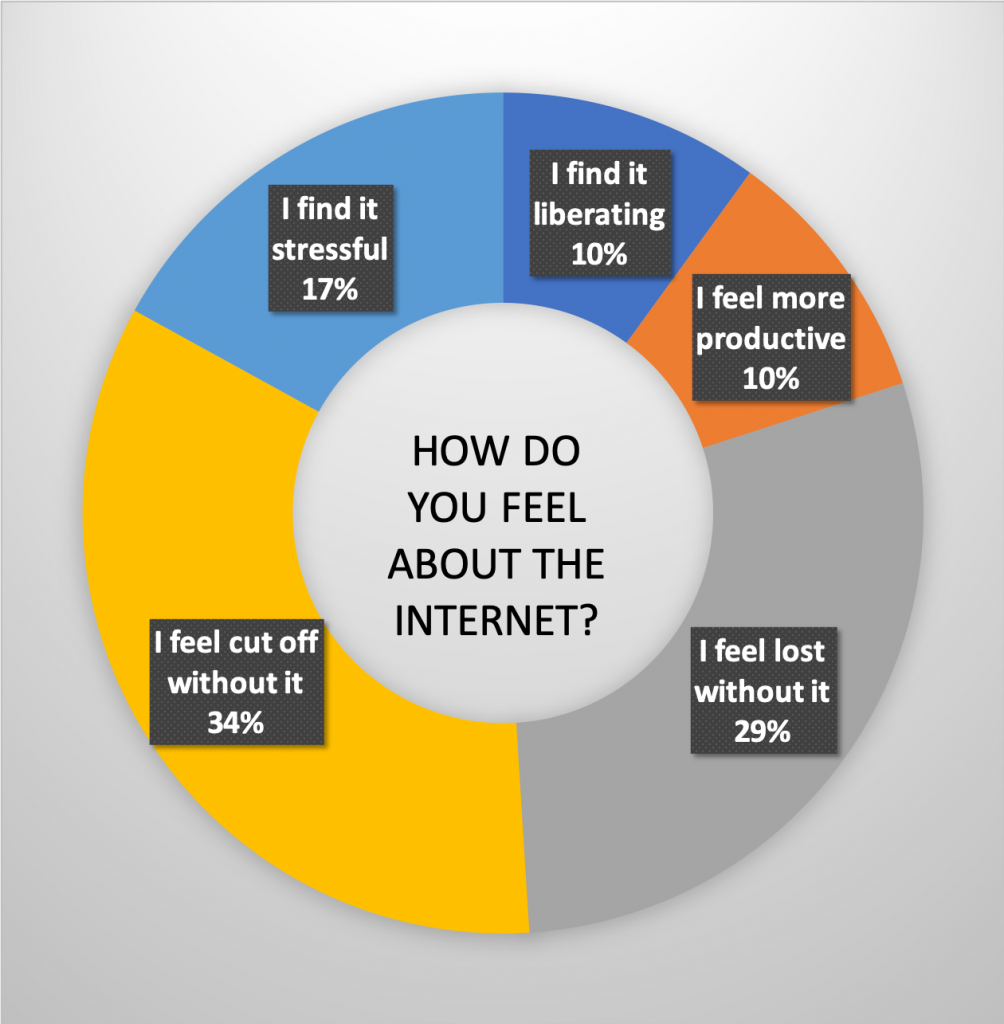How do you feel about the always-on culture?
“Ubiquitous computing” is the concept of using small internet-connected and inexpensive computers to help with everyday functions in an automated fashion. Over the last 30 years, we’ve seen a trend away from a large expensive desktop computer to smaller (still expensive) smartphones and wearables. With the trend of the hardware becoming ever smaller, more reliable and more ubiquitous. At the same time software is becoming more frictionless, more user-friendly to the point where it is invisible. This is feeding an always-on culture one where it is difficult to switch off. How do we live a balanced life with such technology?

My early technology journey.
I remember the first time I got to use a computer, I was eight years old and it was in Primary school. We had a RML 480Z that had a basic programming language. We could teach it to draw geometric shapes. Once I figured out the instructions the computer would magically draw a shape. We each had to take turns to use the computer but it was an amazing experience. The once a week it took to get permission to access that computer was well worth the wait.
It wasn’t long before my parents bought me a Commodore 64. It took 20 minutes for the cassette tape to load the game but was well worth the wait.
In 1987 I got an Amiga 500, when convincing 3D started to appear in games. With constant swapping of 3.5inch diskettes to play all the elements of the game. But those games would load in a few minutes so it was quite a bearable delay.

When I got an Apple Performa 5200 which had a 14.4 Kb/s modem the internet age started for me. I had to check that there was no one using the phone line before I could get connected. How about that for friction! But the amazing ability to get news from all over the world. I could talk to people in other countries which was revolutionary. Email was available at University and the internet was just starting to be accessible. At the library I could get access to the World Wide Web it was awesome.
Dramatic improvement in technologies
The relentless march of technological improvements has reduced the friction from the human to computer interface. Nowadays we hardly think twice about an always-on connection. In fact, if we are disconnected from the Web for more than a few hours it is like an essential service has been removed.
Over the last 30 years we have seen the evolution of various technologies:
- The evolution of data mediums from punched card to tape to disk to hard disk drives to SSD’s.
- The expansion of internet connectivity from dial-up to broadband to fibre broadband to 5G.
- Computers have become ever more accessible from Desktop to Laptop to smartphones to wearables.
- A multitude of sensors measuring everything all the time from heart rate monitors to facial recognition.
- A huge leap in the development of processing power and the advent of quantum computing
- The development of software particularly neural networks and machine learning that allow the manipulation and extraction of meaningful information from unstructured data.
Technologies that disappear
“The most profound technologies are those that disappear. They weave themselves into the fabric of everyday life until they are indistinguishable from it.”
Mark Weiser’s well-known “The Computer for the Twenty-First Century” (Scientific American, 1991, pp. 66–75)
Eric Schmidt is famous for saying that “the internet will disappear”. What he means by that is that there is a complete frictionless interface between man and machine.
Frictionless user experience
Good user experience is one that is not memorable. Something just happens logically as you expect it too, without you having to learn something new.
The gambling industry has made this into an art form removing all distractions and frustrations. People just play the game to extinction (no money).
Jeff Bezos understood this profoundly and pioneered the one-click ordering and next day delivery in Amazon Prime. Its the modern shopaholic dopamine rush to be able to order something on Amazon at 10 pm and have it delivered to your door in less than 24 hours. Purchasing can become addictive such that we don’t even notice it. Removing the frustrating payment screen reduces friction and makes the sale a sure thing. The best experience is the frictionless ones that just happen with the minimum of fuss and is totally forgettable.
I thought the film “Wall-e” that Pixar produced in 2008, was brilliant in its presentation of Ubiquitous computing. Surely we risk a future that is frictionless where technology becomes so all-encompassing we don’t notice it is there. Even Worse, that we become so predictable and malleable that AI can know what we want or push us to buy things we don’t want!
Friction is good sometimes
So, perhaps friction is good sometimes. We have all wanted to download an app or access a website and had to go through the acceptance of terms and conditions and privacy statements. That can be frustrating but it is important to understand what we are accepting and what we are giving away for free.
Some of the most vulnerable and naive members of society, our children are experiencing this from birth. As parents, we are talking about our children or posting pictures of them online and this is adding to their digital record which with facial recognition software is becoming a permanent record.
How about teenagers? Who amongst us has not done something they regretted when they were younger? The natural pains of growing up transitioning from child to adult, discovering sexuality, developing our identity, establishing a career, choosing a life partner, going through significant life events etc.
With ubiquitous computing, there is now no longer any privacy, or any safe places of refuge to make mistakes and learn from them without the whole world knowing. Whilst there is a lot of amazing good to be found on the internet. There are also tremendous peer pressure and fear of missing out.
A decade of digital dependancy
Ofcom released a report comparing the use of digital from 2008 to 2018 with 34% of people saying that feel cut off if they do not have access to the internet. Another 29% say they felt lost without it and 17% find it stressful.

The key point is that technology is becoming ubiquitous and frictionless. Driven by a few technology companies like Google, Facebook, Apple, Netflix etc. The use of persuasive technologies and understanding of our preferences creates a lot of behavioural data. This can be used to influence and persuade us to make a purchase by targetted ads at critical times.
Conclusion
Are we heading to a dystopian future (a bad place)? Where we are so engrossed in our technology and ourselves that we become the humans of the Wall-e film? Or will we find Utopia (a good place)?
The trends are emerging in Artificial intelligence (see my previous blog on Surveillance capitalism) which is pushing people to be more predictable. Coercing people with attractive information that feeds their biases. Which leads us to buy product X, follow politician Y or do action Z.
Our children are having to navigate an always-on culture. Where there is no sanctuary from the relentless always-on culture. In a formative time when image and personal identity is being formed this is a challenge. One misjudgement could remain on social media for years to come. There is social pressure to conform to their peers. To be an individual or radical is not trendy anymore.
Ubiquitous technologies take away all the friction of using a computer and make it seem effortless. It is all the more important to consider these questions:
How do we regulate technology? Respect privacy? Uphold the right of sanctuary? (Freedom from surveillance)
All these questions need to be answered but like all great initiatives they need to start with a mission:
- Bill Gates had the ambition to put a computer in front of everyone.
- Larry Sergei wanted to document all the knowledge of humanity.
- Elon Musk wants to accelerate the world’s transition to sustainable energy.
There needs to be a mission for society and technology that addresses these questions and respects human sovereignty over our own lives. So that we are able to have valuable relationships with the people we love using technology as a tool, not as a controlling force.
How do you deal with the always-on culture? What strategies do you use to lead a balanced life with healthy relationships? I would love to hear your comments on this.
